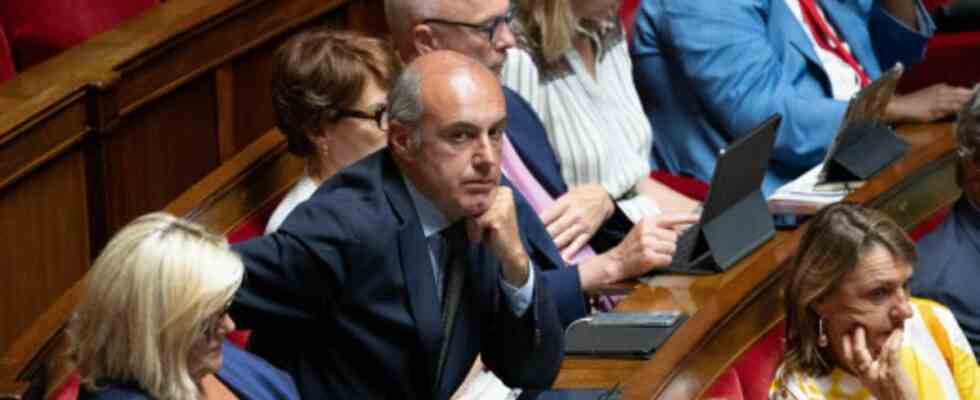So, the National Assembly, is that compromised? Let’s not delay giving the answer: for the moment, not masses. Since Monday, the deputies have been examining in public session the long-awaited emergency bill on purchasing power. The debates are long, tense, sometimes even acrimonious – the ovation during the almost unanimous vote on the deconjugalization of the Disabled Adult Allowance, on the night of Wednesday to this Thursday, is the exception. The scheme is almost always the same: Nupes, and especially rebellious France, monopolizes most of the floor to defend its numerous amendments, the majority almost never responds on the merits, but on questions of order. And no amendment passes, with three small exceptions more symbolic than anything else. We are not far from the compromises so much announced by the Prime Minister, and the oppositions were largely moved by it.
Faced with the lament of this state of affairs by the ecologist Sandra Regol in session, the Renaissance deputy, Christine Le Nabour made a confession that was perhaps a little too explicit: “We never said that we wanted to compromise with you. In the majority, we contest in part, criticizing the “radicality” of the proposals and the attitude of the left and recalling the vote of socialist amendments in committee. “Yes, five, purely technical,” replies a socialist adviser, a nervous smile on his lips. “Compromises are built over time. There we are on emergency texts ”, defends the deputy MoDem Erwan Balanan.
“No opening”
However, we thought we saw the beginnings of a compromise, in particular on the amending finance bill (which will follow in the Assembly and must finance the measures of the purchasing power package currently under discussion). When some MPs from the left wing of the majority – including former ministers – proposed an amendment that largely takes over the tax on superprofits from big business during the crisis proposed by Nupes. Wednesday morning, it was already almost no longer a question, the Minister of Economy and Finance, Bruno Le Maire, not being very hot. “I do not see any opening, notes Gérard Leseul, the main socialist speaker on the text. This tax has however been implemented elsewhere, and even several times in France already. “The macronists rely on companies:” At this stage, we want to wait and see if they can return part of their exceptional profits to the French, prefers Thomas Cazenave, Renaissance deputy from Bordeaux. If this does not move, we will consider a tax response. “Not before the budget, in the fall, therefore.
More serious are the negotiations between the government and Olivier Marleix, president of the LR group. “The word negotiation is not necessarily the most suitable, cuts MP LR Véronique Louwagie. Let’s say we talk to the executive. The party would like to extend the rebate of 18 cents on a liter of fuel, and increase it… to 40 cents. “But we are open to it being less,” said the MP for Orne. That’s good: Bruno Le Maire said he was open to it. That the government makes Les Républicains its privileged parliamentary partner is not enough to make us fall from our chairs, it was expected. Is it that easy? “We introduced the taste for discussion which was not on the menu of the executive until then”, metaphor Véronique Louwagie, who remains cautious about the outcome of these “discussions”.
Left-right, the return
Basically, does the majority really need this compromise? Even if the debates are long, much longer than expected, the government is gradually passing all its articles without modifications. In reality, as long as the National Rally sticks to its line of criticizing a project that is not ambitious enough in its eyes without blocking its adoption, the executive is quiet. “Our subject is to provide concrete answers on the question of purchasing power, judge Thomas Cazenave, not moved by the situation. That’s good news if the text gets through. It does not matter, therefore, where the votes or the abstentions come from.
For its part, to let it pass, without obtaining anything in return, is the RN not selling off its new influence in the hemicycle? “We asked ourselves the question”, recognizes Jean-Philippe Tanguy, deputy of the Somme, well aware that his party will have to take care to make it understood on the ground that he has “tried everything to obtain better, but that the government didn’t want to hear anything”. In the meantime, all the ground in the hemicycle is left to Nupes in its face-to-face with the macronists. With a government that seeks its rare compromises much more to the right than elsewhere, the debates of this beginning of the new legislature smell good of the left-right divide.
“We see that there is an almost philosophical left-right debate that has taken hold, in particular on the recognition of work”, notes, like others, the socialist Gérard Leseul. Thus “we demonstrate that they do not want to compromise”, believes the co-president of the environmental group, Julien Bayou. “There is a risk” that the cleavage will re-establish itself in the Assembly, recognizes there too Jean-Philippe Tanguy. “If it were to happen like that, then yes, it would be a big problem for us,” worries a majority MP. A good deal for the left? “To choose, prefer victories, I prefer to beat the government”, slice the rebellious Eric Coquerel. In a minority parliament, under the permanent threat of early elections, it’s still the kind of consolation prize that is taken well.

